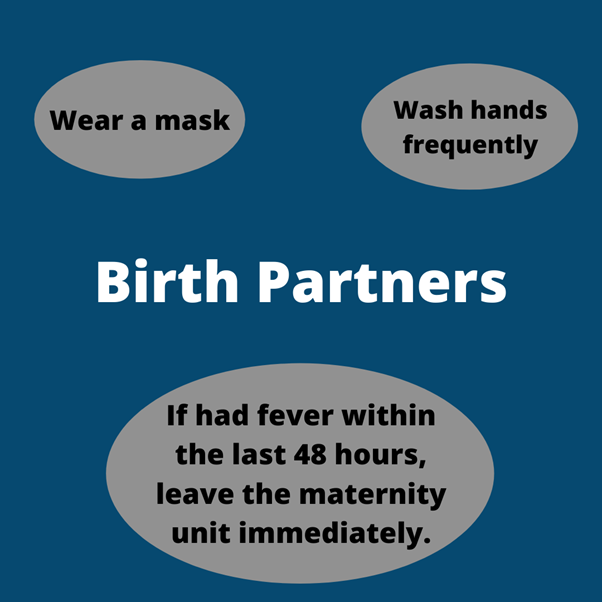
What are the considerations for birth partners during the COVID-19 pandemic?
• Women should be supported and encouraged to have a birth partner present with them during active labour and birth if they wish to do so.
• Birth partners who are symptomatic, or in a period of self-isolation for confirmed SARS-CoV-2 infection, should remain in self-isolation at home and not attend the hospital.
• NHS England recommends efforts should be made to utilise the available testing capacity to test both the woman and her birth partner to mitigate infection risk where resources allow.
• Local level risk assessments should be made for each maternity service space (for example shared wards) to identify if there are elevated risks of SARS-CoV-2 transmission from the presence of a birth partner.
• On attendance at the maternity unit, all birth partners should be asked whether they have experienced any symptoms suggestive of COVID-19 in the preceding 10 days, e.g. fever, acute persistent cough, changes in or loss of sense of smell (anosmia) or taste.
- If they have had symptoms within the last 10 days, the birth partner should leave the maternity unit immediately and self-isolate at home, unless they have had a negative test result for SARS-CoV-2 since the onset of symptoms.
- If they have had a fever within the last 48 hours, birth partners should leave the maternity unit immediately and self-isolate at home, regardless of their test result.
• Birth partners, not otherwise advised to be self-isolating, should be allowed to stay with the woman through labour and birth, unless the birth occurs under general anaesthetic. Further guidance about access to maternity services for a birth partner and other supportive adults has been published by the NHS and should be followed as far as possible.
• Birth partners should wear a face covering unless exempt, remain by the woman’s bedside, be advised not to walk around the ward/hospital and should wash their hands frequently.
• Restrictions on visitors should follow local hospital policy.
• Trusts and health boards should prioritise the birth partners of women who require continuous support, such as women with disabilities, communication challenges or complex medical, mental health or social factors.

